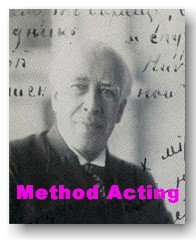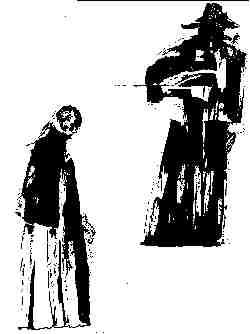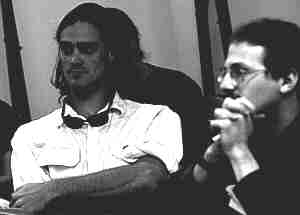No, first we have to talk about how this spectator's chronotope is PRE-DESIGNED.
The stage is the space in focus. Any house is designed to direct the attention. Procenium theatre is stronger that the arena (architecturally, to the point that we have to separate the two by light). The next level of concentration -- actor, a point, dot, next to the mass of the audience. Another contrast (Dialectics): many and one.
So, what is the synthesis? The third, which combines both and has the new quality? The show? Something, which overcomes the limitations of many and limitations of one.
Space and time on stage (objective, of course) is a negation of actor (and the public, since all of them are mortals). This is the place where the opposites meet -- both in negation! The ground for IDENTIFICATION (not on the conscience level). How do we overcome the objective time-space in order to create this subjective chronotope of the show? We need actor (most active spactetor) to transform the "empty space" into OUR space, to make space and time motivated (humanized).
POV and TECH are to go intro "nofiction novels" direction: how I use the metaphysics text to help Virtual Theatre and this book?
First, thesis and antithesis. Stage and Public. Which one?
Even in ritual we have two parts: the performers and the chorus (not leaders). This is the future public, the foundation of the theatre. It doesn't matter, if we take the public as a thesis (we can try both), what is imposrtant is the DIFFERENCE, and even opposition -- the conflic of the two. Contrast: imoble and silect vs. moving and atriculated. Two phazes of being. How about "life and death"? We have to suspend spectators existence in order to FORM art! First choice to make: are you on stage or not?
I place Nietzsche's quotes on in order to force myself to keep writing in that kind of style.
Good writing that is.
TWO ACTORS
Aeschylus first introduced a second actor; he diminished the importance of the Chorus, and assigned the leading part to the dialogue. Sophocles raised the number of actors to three, and added scene-painting. (Poetics IV)
Narrative vs. Dramatic: Tragedy, then, is an imitation of an action that is serious, complete, and of a certain magnitude; in language embellished with each kind of artistic ornament,
the several kinds being found in separate parts of the play; in the form of action, not of narrative; through pity and fear effecting the proper purgation of these emotions. (Poetics VI)
[imitation of action, not action?]
Again, Tragedy is the imitation of an action; and an action implies personal agents, who necessarily possess certain distinctive qualities both of character and thought; for it is by these that we qualify actions themselves, and these --
thought and character -- are the two natural causes from which actions spring, and on actions again all success or failure depends. Hence, the Plot is the imitation of the action -- for by plot I here mean the arrangement of the incidents. By Character I mean that in virtue of which we ascribe certain qualities to the agents. Thought is required wherever a statement is proved, or, it may be, a general truth enunciated. Every Tragedy, therefore, must have six parts, which parts determine its quality -- namely, Plot,
Character, Diction, Thought, Spectacle, Song. Two of the parts constitute the medium of imitation, one the manner, and three the objects of imitation. And these complete the fist. These elements have been employed, we may say, by the poets to a man; in fact, every play contains Spectacular elements as well as Character,
Plot, Diction, Song, and Thought.
But most important of all is the structure of the incidents. For Tragedy is an imitation, not of men, but of an action and of life, and life consists in action, and its end is a mode of action, not a quality. Now character determines men's qualities, but it is by their actions that they are happy or the reverse. Dramatic
action, therefore, is not with a view to the representation of character: character comes in as subsidiary to the actions. Hence the incidents and the plot are the end of a tragedy; and the end is the chief thing of all. Again, without action there cannot be a tragedy; there may be without character. (Poetics VI)
Plot: the soul of drama
The plot, then, is the first principle, and, as it were, the soul of
a tragedy; Character holds the second place. A similar fact is seen in painting. The most beautiful colors, laid on confusedly, will not give as much pleasure as the chalk outline of a portrait. Thus Tragedy is the imitation of an action, and of the agents mainly with a view to the action.
Third in order is Thought -- that is, the faculty of saying what is
possible and pertinent in given circumstances.
Show
The Spectacle has, indeed, an emotional attraction of its own,
but, of all the parts, it is the least artistic, and connected least
with the art of poetry. For the power of Tragedy, we may be sure, is
felt even apart from representation and actors. Besides, the
production of spectacular effects depends more on the art of the stage machinist than on that of the poet.
4. Diction and/or language
5. Song (melody)
Three parts
Now, according to our definition Tragedy is an imitation of an action that is complete, and whole, and of a certain magnitude; for there may be a whole that is wanting in magnitude. A whole is that which has a beginning, a middle, and an end. A beginning is that which does not itself follow anything by causal necessity, but
after which something naturally is or comes to be. An end, on the contrary, is that which itself naturally follows some other thing, either by necessity, or as a rule, but has nothing following it. A middle is that which follows something as some other thing follows it. A well constructed plot, therefore, must neither begin nor end at haphazard, but conform to these principles. (Poetics VII)
we may say that the proper magnitude is comprised within such limits, that the sequence of events, according to the law of probability or necessity, will admit of a change from bad fortune to good, or from good fortune to bad. (Poetics VII)
Unity of plot does not, as some persons think, consist in the unity of the hero.
For infinitely various are the incidents in one man's life which cannot be reduced to unity; and so, too, there are many actions of one man out of which we cannot make one action. (Poetics VIII)
the plot, being an imitation of an action, must imitate one action and that a whole, the structural union of the parts being such that, if any one of them is displaced or removed, the whole will be disjointed and disturbed. For a thing whose presence or absence makes no visible difference, is not an organic part of the whole. (Poetics VIII)
It is, moreover, evident from what has been said, that it is not the function of the poet to relate what has happened, but what may happen--what is possible according to the law of probability or necessity. (Poetics IX)
Of all plots and actions the episodic are the worst. I call a plot 'episodic' in which the episodes or acts succeed one another without probable or necessary sequence. (Poetics IX)
But again, Tragedy is an imitation not only of a complete action, but of events inspiring fear or pity. Such an effect is best produced when the events come on us by surprise; and the effect is heightened when, at the same time, they follows as cause and effect. The tragic wonder will then be greater than if they happened of
themselves or by accident; for even coincidences are most striking when they have an air of design. (Poetics IX)
Reversal of the Situation is a change by which the action veers round to its opposite, subject always to our rule of probability or necessity. (Poetics XI)
Recognition, as the name indicates, is a change from ignorance to knowledge, producing love or hate between the persons destined by the poet for good or bad fortune. The best form of recognition is coincident with a Reversal of the Situation, as in the Oedipus. (Poetics XI)
Two parts, then, of the Plot -- Reversal of the Situation and Recognition -- turn upon surprises. A third part is the Scene of Suffering. The Scene of Suffering is a destructive or painful action, such as death on the stage, bodily agony, wounds,
and the like. (Poetics XI)
for pity is aroused by unmerited misfortune, fear by the misfortune of a man like ourselves. (Poetics XIII)
Part XVIII
Every tragedy falls into two parts -- Complication and Unraveling or
Denouement. Incidents extraneous to the action are frequently combined with a portion of the action proper, to form the Complication; the rest is the Unraveling. By the Complication I mean all that extends from the beginning of the action to the part which marks the turning-point to good or bad fortune. The Unraveling is that which extends from the beginning of the change to the end.
There are four kinds of Tragedy: the Complex, depending entirely on Reversal of the Situation and Recognition; the Pathetic (where the motive is passion)[]; the Ethical (where the motives are ethical) []. The fourth kind is the Simple.
In speaking of a tragedy as the same or different, the best test to take is the plot. Identity exists where the Complication and Unraveling are the same. Many poets tie the knot well, but unravel it Both arts, however, should always be mastered.
Again, the poet should remember what has been often said, and not make an Epic structure into a tragedy - by an Epic structure I mean one with a multiplicity of plots...
Part XXIII
As to that poetic imitation which is narrative in form and employs a
single meter, the plot manifestly ought, as in a tragedy, to be
constructed on dramatic principles. It should have for its subject a
single action, whole and complete, with a beginning, a middle, and
an end. It will thus resemble a living organism in all its unity,
and produce the pleasure proper to it.
Tragic art, then, as a whole, stands to Epic in the same relation as the younger to the elder actors. So we are told that Epic poetry is addressed to a cultivated audience, who do not need gesture; Tragedy, to an inferior public. Being then unrefined, it is evidently the lower of the two. (XXVI) but since Epic
poetry could be included in, Tragedy is a superior form.















